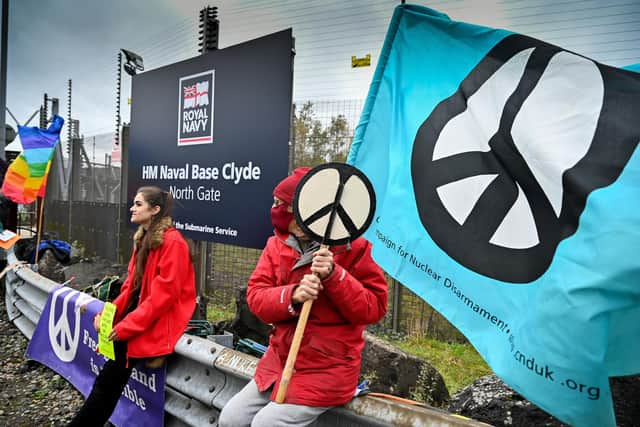Independent Scotland could be anti-nuclear and join Nato, says leading campaigner
The assertion comes after the SNP’s foreign affairs spokesperson in Westminster, Alyn Smith, appeared to hint the party may ditch its support for signing a treaty against nuclear weapons to join Nato.
He later attempted to clarify his remarks, stating he stood by the commitment for an independent Scotland to sign the Treaty on the Prohibition of Nuclear Weapons (TPNW).
Advertisement
Hide AdAdvertisement
Hide AdBeatrice Fhin, executive director of the International Campaign to Abolish Nuclear Weapons (ICAN) and a Nobel Peace Prize winner, said it was imperative for an independent Scotland to pursue an “independent foreign policy” based on Scottish people’s “strong opposition” to nuclear weapons.
She said: “We know that the risk of nuclear war has increased these last months and because of the nuclear base in Faslane, Scotland is at risk. Prohibiting nuclear weapons is therefore an imperative for Scotland in order to protect its own people and for achieving global nuclear disarmament.
"If Scotland becomes independent, it must pursue a genuinely independent foreign policy based on the Scottish people's strong opposition against nuclear weapons. It cannot continue to let nuclear armed states dictate what it can and cannot do. It is fully possible to join the TPNW and be a member of Nato."


A report by ICAN published in June last year states while Nato has “essentially imposed a blanket ban” on member states signing the TPNW, there is no legal barrier to joining.
TPNW signatories could remain in military alliances, but would need to end participation in ‘nuclear burden-sharing’ and other nuclear-related military activities
The report adds there is no commitment within the North Atlantic Treaty to particular means of achieving desired outcomes, and while there are “potential political ramifications” to being anti-nuclear within Nato, “from a legal perspective, joining the TPNW and remaining a member of Nato are compatible”.
Mr Smith’s comments concerned some within the independence movement and sparked criticism from the Scottish arm of the Campaign for Nuclear Disarmament (CND).
Janet Fenton, co-vice chair of the Scottish CND, said she was “absolutely astonished” by the comments from Mr Smith. She said signing the TPNW would mean no nuclear weapons on Scottish soil.
Advertisement
Hide AdAdvertisement
Hide AdMs Fenton said: “Nato does not have to have a nuclear weapons policy, but it is in the TPNW that you cannot allow any nuclear weapons on your territory. That is why it is so significant that the First Minister and a large majority of Scottish politicians have signed up to support.
"[Having nuclear weapons] is a policy that is increasingly coming to be on an increasingly shoogly nail as the global picture changes.
"The situation in Ukraine makes that abundantly clear. All it has done is that people are so terrified of [Russian president] Vladimir Putin using them that they are not effectively protecting Ukraine.
“For Scotland to want to be part of that seems to me to be flying in the face of everything that is good about the possibility of a future independent Scotland.”
In other comments from his appearance at an independence conference in Aberdeen last weekend, Mr Smith also said the SNP may shift its approach to nuclear weapons to win an independence referendum.
He told activists: “We can, from a principled and pragmatic stance, put forward to the people of Scotland, this is what we think is going to be best to keep you safe.
"Other parties in the Yes movement, other organisations in the Yes movement will have their versions.
"But let’s look at where the people of Scotland are – 45 per cent of people in Scotland are quite comfortable with nuclear weapons staying on our soil.
Advertisement
Hide AdAdvertisement
Hide Ad"So we can fall out about the narcissism of small differences amongst ourselves or we can focus on what is going to get the most people in Scotland over the line for Yes.”
A Scottish Government spokesperson said: “There is no change in our position to the Treaty on Prohibition of Nuclear Weapons. We support the principles of the treaty and remain keen signatories in working with allies towards worldwide nuclear disarmament.”
Want to hear more from The Scotsman's politics team? Check out the latest episode of our political podcast, The Steamie.
It's available wherever you get your podcasts, including Apple Podcasts and Spotify.
Comments
Want to join the conversation? Please or to comment on this article.

